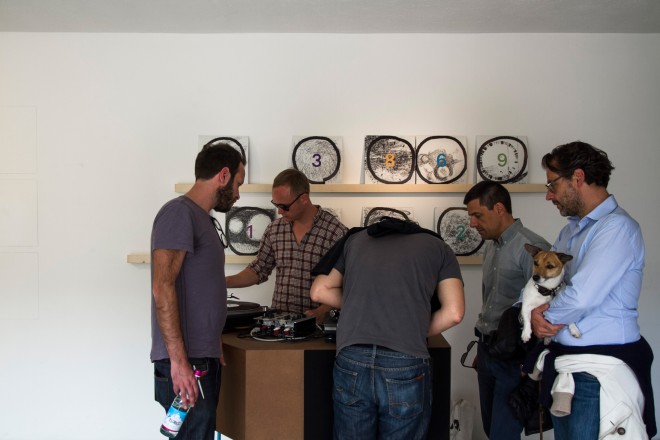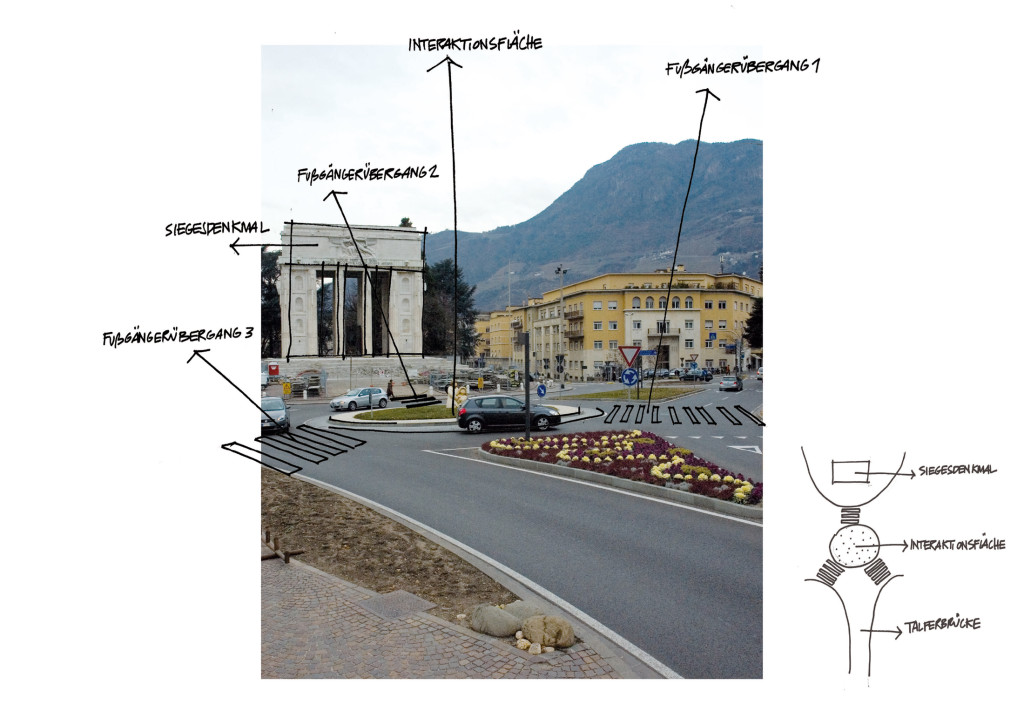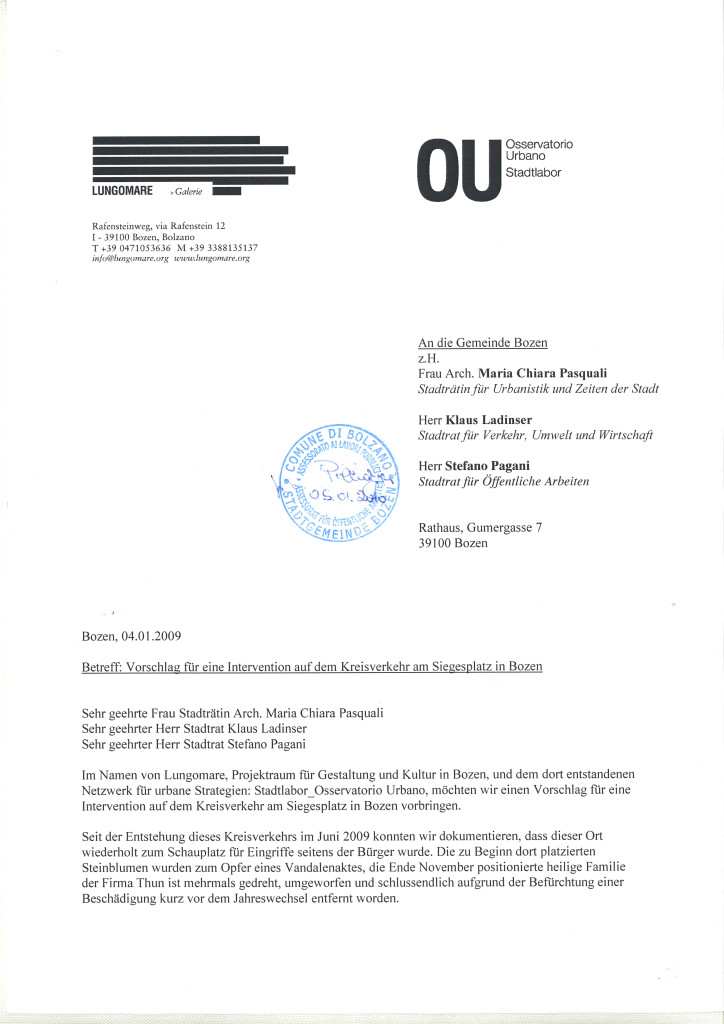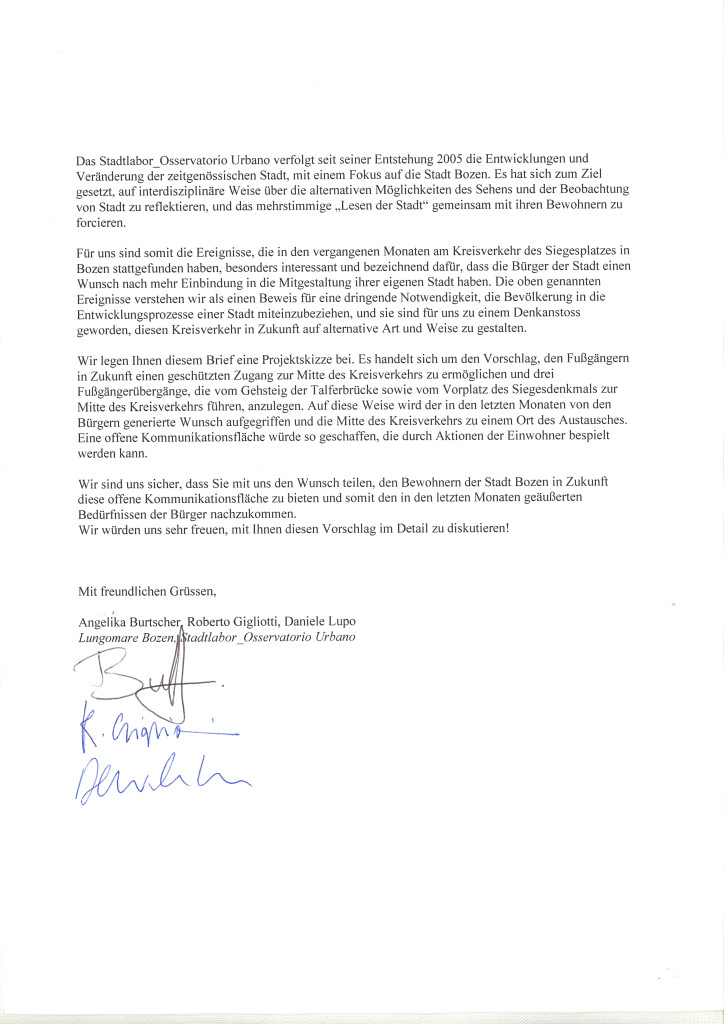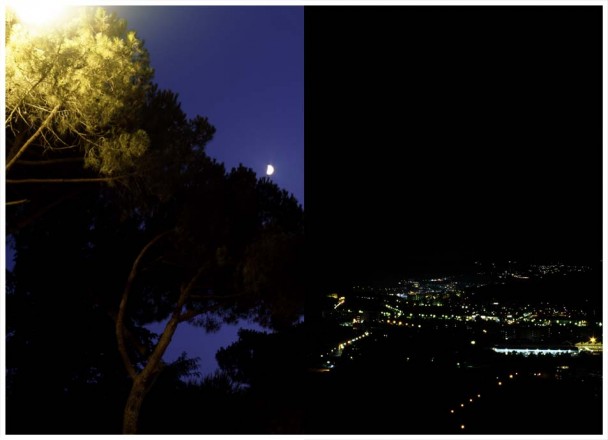Osservatorio urbano # 3
Statt der Engel
In the Statt der Engel project, Osservatorio Urbano/Lungomare (Angelika Burtscher, Roberto Gigliotti, Daniele Lupo) analyse the branding that the company Thun, an important local employer impresses on the city of Bolzano-Bozen, by strategically using urban space during the Christmas period for the marketing of its pottery angels. However at night the angels took on a life of their own, their boards were turned over and they ended up laid out on the ground. For the artists, designers and architects this constitutes the starting point for proposing to the local council a project for making this island at the centre of the roundabout accessible to all.
Remise Bludenz (A) / Galerie AllerArt
transparadiso: Barbara Holub and Paul Rajakovics
Group exhibition at Remise Bludenz (A) / Galerie AllerArt
Curated by transparadiso
Participants:
Michael Ashkin, New York
Stadtlabor_Osservatorio Urbano, Lungomare Bozen Community
Museum Project, Hong Kong
Céline Condorelli, London
Teddy Cruz, San Diego
feld 72, Vienna
Public Works, London
Jens Emil Sennewald, Paris
Allan Siegel, Budapest
SMAQ, Berlin
Gerald Straub, Vienna
transparadiso, Vienna
Georg Winter, Stuttgart/ Saarbrücken
Who still believes in miracles? And what are actually urban miracles? How much insistence, courage, boldness, despair and confidence is needed to make miracles happen in the public/ urban space and in socio-political realm? transparadiso has invited artists/ urbanists/ architects/ cultural producers from different cultural contexts to discuss these aspects and show their personal experience and interpretation of miracles happening in the public realm and urban space. […] They offer a range of visible and surprisingly successful miracles in urban space to more poetic-narrative spaces which could eventually lead to miracles in real space.
If one has in mind that each miracle is preceded by a longing, one might explore the potential of transferring the Urban Miracle to the Regional Miracle, or consider how a Regional Miracle could start on its own.
A catalog will be published by Bucher Verlag.
Lungomare promotes since 2005 the OU_Osservatorio Urbano project. Since its foundation in 2003, Lungomare has offered itself as a meeting place and as somewhere to exchange views on project culture and on creative arts. The underlying nature of these discussions is the curators’ desire not only to exclusively address experts but also to involve the public on a vast scale. Furthermore, the curators of the gallery have transformed these discussions into tangible interventions created both in the Lungomare exhibition space and in public spaces. The leitmotiv which links these interventions is the exploration of everyday life in all its forms. It was also starting from these assumptions that the OU_Osservatorio Urbano project was born.
The project takes on the challenge of tackling the theme of the city, avoiding a direct dialogue with the traditional instruments of town planning which are too closely connected with an objective representation of data and too far from common comprehension. A transversal approach was defined and phenomenon were tackled which were different from those usually dealt with by urban analysis and planning. The concentration was deliberately moved onto aspects such as spontaneity, emotions and unpredictability. Moreover, in order to widen the point of view proposed by the project, word is passed in the projects of OU_Osservatorio Urbano onto other disciplines and other outlooks.
The OU_Osservatorio Urbano is structed as a temporary workshop, within which it is possible to come face to face with the images and impressions that the inhabitants have of the city in which they live. The temporary laboratory is a wider long term project which proposes the objective of observing urban space in an intuitive and interdisciplinary fashion, and the creative processing of strategies for urban reading and perception.
What´s on
EXHIBITION :: Binta Diaw :: Collective Practices – A Living Experience of Feeling ListenedAbout Lungomare
Lungomare, a cultural association founded in Bolzano in 2003, was created from the desire and necessity to open a space in which to share differences, experiences, opinions and desires, a space in which to make the link between cultural production and the political and social dimension. Lungomare undertakes projects that investigate and test possible relationships between design, architecture, urban planning, art and theory, the results of which are presented in different formats: public discussions, conferences, publications, exhibitions and interventions in public spaces. All these formats are characterised by the intention to interact with cultural and socio-political processes relating to the region in which Lungomare is located.
Currently Lungomare’s activities focus on long-term residency projects, a format whereby Lungomare invites guests to engage and interact within the context of South Tyrol. Lungomare’s activities are based on three principles: specific attention to the context in which the association’s projects are undertaken, the transdisciplinary approach that distinguishes these projects, and reflection on the role of Lungomare as a cultural institution in connection with the region in which it operates.
Territory
Lungomare is located at the edge of Bolzano, the capital of South Tyrol, and relates to the context in which it operates, attempting to highlight the dynamics of change. Large urbanized areas alternate with broad areas of intensive cultivation and yet others of picturesque landscape, all of which penetrate the centre of the city. The city is surrounded by mountains and this is one of the reasons why the tourism industry has become a driving force in this locality. The demographic structure of the city has been characterized for a long time by the coexistence of two populations, those speaking German and those speaking Italian. However, the social and demographic composition of Alto Adige Südtirol is changing. Migrants, including those from non-European countries are making their way to the area to settle, whilst others, including political refugees, are flowing through the region.

